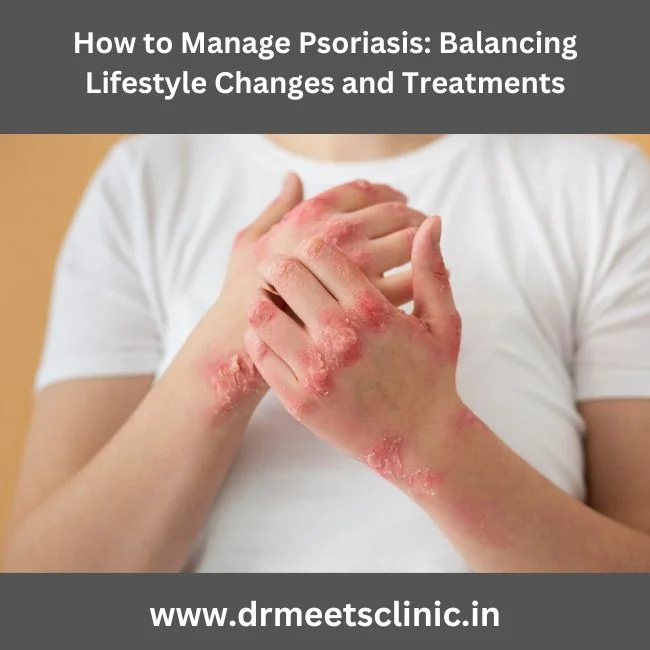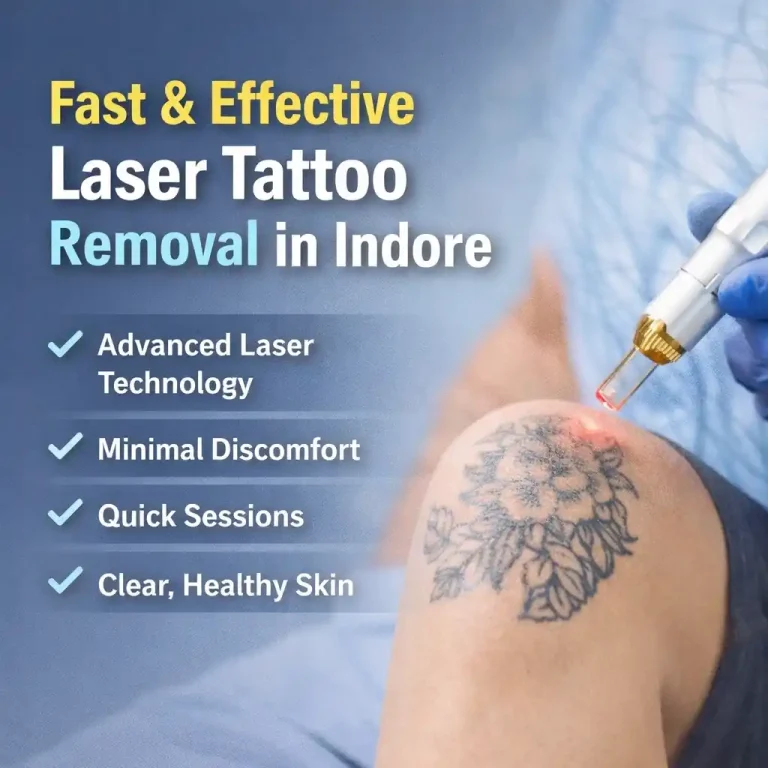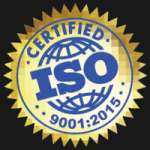Psoriasis is a chronic skin condition that affects millions of people worldwide, causing red, scaly patches that can be itchy, painful, and emotionally distressing. While there is no definitive cure, effective management of psoriasis is possible through a combination of treatments and lifestyle changes. If you’re seeking psoriasis treatment in Indore, this guide offers insights into balancing therapies with day-to-day practices for a healthier, more comfortable life.
Understanding Psoriasis
Psoriasis occurs when the immune system triggers rapid skin cell production, leading to an accumulation of cells on the surface. This results in the characteristic patches of thickened, inflamed skin. The condition can range from mild to severe, with symptoms that vary from person to person.
Common Types of Psoriasis:
Plaque Psoriasis: The most prevalent kind, plaque psoriasis, is characterized by elevated, red spots that are scaled in silver. Small, drop-shaped lesions that are frequently brought on by infections are known as guttate psoriasis.
Inverse Psoriasis: Red, shiny lesions in skin folds such as underarms or groin.
Pustular Psoriasis: White pustules surrounded by inflamed skin.
Erythrodermic psoriasis: An uncommon, severe kind that results in extensive skin redness and shedding.
Importance of Lifestyle Changes in Psoriasis Management
Lifestyle modifications play a vital role in complementing professional psoriasis treatment in Indore. These changes can help reduce triggers, minimize flare-ups, and improve overall quality of life.
1. Healthy Diet and Nutrition
A well-balanced diet rich in anti-inflammatory foods can support your immune system and reduce the severity of symptoms.
Focus on:
Fruits and vegetables rich in antioxidants.
Omega-3 fatty acids from fish, flaxseeds, or walnuts.
Whole grains and lean proteins.
Avoid:
Processed foods, sugary snacks, and excessive alcohol.
Foods that trigger inflammation, like red meat and high-fat dairy products.
2. Stress Management
Stress is a common trigger for psoriasis flare-ups. Finding ways to manage stress can significantly improve your condition.
Tips:
Practice mindfulness and meditation daily.
Incorporate physical activities such as yoga or walking.
Take part in enjoyable pastimes or pursuits.
3. Maintain a Skincare Routine
Caring for your skin is essential to managing psoriasis effectively. A good skincare routine can soothe irritated areas and prevent dryness.
Dos:
Use gentle, fragrance-free moisturizers to keep the skin hydrated.
Take lukewarm baths with added oatmeal or Epsom salts for relief.
After taking a bath, pat your skin dry rather than rubbing it.
Don’ts:
Steer clear of strong washes or soaps that might cause skin irritation.
Limit exposure to hot water, as it can dry out your skin further.
4. Stay Hydrated
Drinking plenty of water helps keep your skin and body hydrated, which is crucial for managing psoriasis symptoms. To maintain ideal hydration, try to consume eight glasses of water or more each day.
5. Avoid Smoking and Alcohol
Both smoking and excessive alcohol consumption are known to worsen psoriasis. Quitting smoking and moderating alcohol intake can improve your symptoms and overall health.
Treatment Options for Psoriasis
While lifestyle changes are essential, professional treatments tailored to your condition are equally important. If you’re considering psoriasis treatment in Indore, consult with a dermatologist to explore the following options:
1. Topical Therapies-
These involve the application of creams and ointments designed to reduce inflammation, soothe the skin, and slow down cell turnover.
2. Light Therapy (Phototherapy)
This treatment involves exposing the skin to specific wavelengths of natural or artificial light under medical supervision. Phototherapy is particularly effective for mild to moderate psoriasis.
3. Scalp Treatments
Psoriasis often affects the scalp, making specialized care essential. Gentle scalp exfoliation and moisturizing can be combined with targeted treatments to manage symptoms.
4. Lifestyle Counseling
Dermatologists and trichologists can guide you on how to make sustainable lifestyle adjustments that complement your psoriasis treatments.
Managing Triggers
Understanding and avoiding your triggers is critical in managing psoriasis effectively. Common triggers include:
Weather Changes: Cold, dry weather can worsen symptoms. Protect your skin with moisturizers and humidifiers during winter.
Infections: Viral and bacterial infections can trigger flare-ups. Strengthen your immune system with a healthy lifestyle.
Medications: Some medications may aggravate psoriasis. Always consult your doctor before making changes to your medication regimen.
Skin Injuries: Cuts, scrapes, or burns can lead to new patches of psoriasis in a phenomenon known as the Koebner effect.
When to Seek Professional Help
If you notice persistent symptoms despite following a good skincare routine and lifestyle modifications, it’s time to seek expert advice. For those in the region, psoriasis treatment in Indore offers specialized care tailored to your condition. A dermatologist can recommend advanced therapies and monitor your progress to ensure optimal results.
Conclusion
Psoriasis management is about finding the right balance between treatments and lifestyle changes. A nutrient-rich diet, stress management, proper skincare, and professional care are essential components of a comprehensive plan. If you’re in need of expert guidance, consulting a specialist for psoriasis treatment in Indore can help you take the first step toward clearer skin and a better quality of life.
Remember, while psoriasis is a chronic condition, it doesn’t have to control your life. With consistency and the right approach, you can manage it effectively and regain your confidence.

















